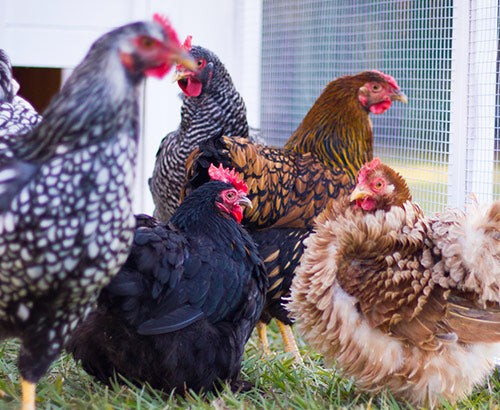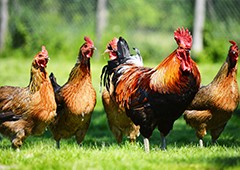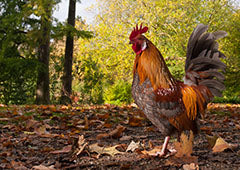When we talk about keeping chooks, most people instantly think of the humble hen - clucking around her backyard in search of scratch, and dispensing delicious eggs on the (almost) daily. But hens are only half the story, and roosters can be a valuable addition to a backyard flock. Even if you have no intention keeping one of these cheeky boys, it helps to know how to spot them, and care for or rehome them.
- Do I have a rooster?
It’s not always obvious whether a chook is a hen or a roo - and this can be further complicated by the fact that some kooky hens are known to crow! The easiest time to figure out the gender of your chicken is in early chick-hood, or when they are full-grown. Rebellious teenage chooks (ie. pullets and cockerels) can be quite difficult to tell apart.
Sexing chicks
There are three ways of sexing chicks, which are explained in more detail in this article. In short, these are:
- Wing feathers: hens are often born with wing feathers, or develop them in the first week of life. Roosters usually develop them after the first week. The ‘pattern’ of wing feathers is another giveaway. Gently spread the chick’s wings: if the feathers are of equal length, you have a male; if the feathers alternate between long and short, you have a female. Finally, females will often develop tail feathers before the males do. Keep up boys!
- Colour combinations: certain hybrid breeds will always hatch in specific colours, indicating gender. Some purebreds also exhibit gendered colouring early in life. Check the full article for a more detailed list.
- Vent sexing: essentially feeling around for the reproductive organs. This is exactly as fiddly as it sounds, and not something we recommend for novice keepers. Your vet will definitely have more luck!
Sexing grown chickens
Once your chooks have completely developed, it’s usually quite easy to tell the girls from the boys - chances are you can do it by instinct! To recap, the differences are:
- Crowing! Crowing is a near-certain sign that you have a rooster on your hands. Most cockerels crow around 10-12 weeks old.
- Large comb and wattle (the fleshy crests around the chicken’s face).
- Thick, powerful legs.
- Saddle (and sickle) feathers - extremely long, pointed feathers covering the chooks bum.
- Hackle feathers - neck feathers that are long and pointy. The bird version of a lion’s mane!
- Upright posture - the boys love to strut their stuff, and their ‘cocky’ walk is hard to miss!
- Attitude - while some hens can be downright sassy, none can compare with a rowdy rooster.
Why would I want a rooster?
Roosters fill an important role in the flock! While the girls busy themselves pecking for grubs, the roo will keep a watchful eye for more food, as well as being alert to any possible dangers. A backyard rooster is generally no match for a fox or determined dog, but a good roo will sound the alarm, and put himself in harm’s way to protect the rest of your chooks, giving you more time to run to the rescue.
A rooster is also essential for hatching your own chicks. Once a rooster has mated with a hen, she will start to lay fertilised eggs which you can hatch using a broody hen or an incubator. Don’t worry, these eggs are still perfectly edible!
Can I keep a rooster in my backyard?
Urban keepers are often discouraged from keeping roosters, believing it to be illegal. While this is true in some councils (for example, Brisbane City Council), many places around Australia have no explicit prohibition on keeping backyard roosters. That said, check with your local council for the laws that apply to you.
However, even if you are technically permitted to keep roosters, they are not exempt from local noise restrictions. Unless both you and your neighbours are the earliest of risers, their cocka-doodle-dooings can be a serious problem. There are steps you can take to either reduce the noise, or delay their crowing, which are covered in this article. They include:
- Anti-crow collars
- Blackout boxes
- Coop design
If you can overcome these barriers, keeping roosters isn’t much more challenging than dealing with the rest of your chooks - give them the right food and a comfy coop, and watch them flourish. Just check their attitude every once in a while to remind them who’s boss!
What do I do with unwanted roosters?
Unfortunately, your circumstances may be such that keeping a backyard rooster is absolutely impossible. Or, you may have hatched a clutch of your own eggs and ended up with more boys than you can manage. Whatever the case, you’ll need to do something about it (if only problems would just disappear!). This article takes you through dealing with unwanted roosters. Our first preference is always to rehome first, but regardless of the outcome, a humane approach is always best.
From breeds to feeds, there are plenty of things to consider when becoming a chicken parent. All chicken keepers need practical information to help them raise a happy, healthy flock. Many of us struggle to handle chicken health or behaviour issues, especially in the first few years of having a flock.
This is why I recommend Chickenpedia to all my readers. They have comprehensive online courses on everything you didn’t know you need to know and then some more! From healthcare to raising baby chicks to feeding and behavior, you’ll find beginner-friendly courses that’ll give you the knowledge and confidence to successfully look after your chickens.
As a member, you will get access to ALL their fantastic courses. No need to wing it, become the ultimate chicken eggspert! Check out Chickenpedia today and with my discount code (BOKBOK50), you can get 50% off!
If you’re looking for a quality, spacious coop for your girls and boys, look no further than the Mansion coop. Or, maybe you want to know more about fertilised eggs? Click on, chicken people!




















